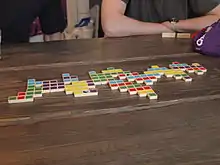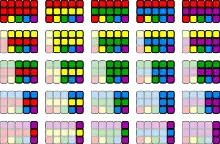Chromino
Chromino is a 2001 board game designed by Louis Abraham, for 2 to 7 players. The game is similar to the classic game of dominoes, but uses colours instead of numbers.

Equipment

Five colours are used: red, blue, purple, yellow and green. Each Chromino piece contains three coloured squares laid out in a single row or column, and all 75 possible combinations of colours are used.[1]
There are also five "wild card" pieces, with a yin-yang symbol in the middle, where the middle square may be used as any colour; the two ends of each "wild card" are both coloured in one of the five colours.[1]
Gameplay
The game begins with a randomly chosen "wild card" piece placed on the board.[1] The rest of the pieces (79) are put in the bag and each player draws eight pieces.[1]
The first turn is given to the youngest player and proceeds clockwise. On each player's turn, the player must take one of two actions:[1]
- Place a piece from their hand, if a legal placement can be made
- Draw another piece from the bag, if no legal placement can be made with the pieces in that player's hand
- If the drawn piece is able to be legally placed, the newly-drawn piece is placed appropriately
Each piece has eight square edges. At least two edges must touch a piece already on the board for a legal placement, and squares of different colours may not touch each other.[1]
When a player has one piece left, they should display it face-up to the other players. A "wild card" piece may not be used as the final piece.[1] The first player to run out of pieces wins but play continues until the end of the round. There can be more than one winner.[1]
References
- "Chromino" (PDF). Zygomatic Games. July 2012. Retrieved 23 February 2023.